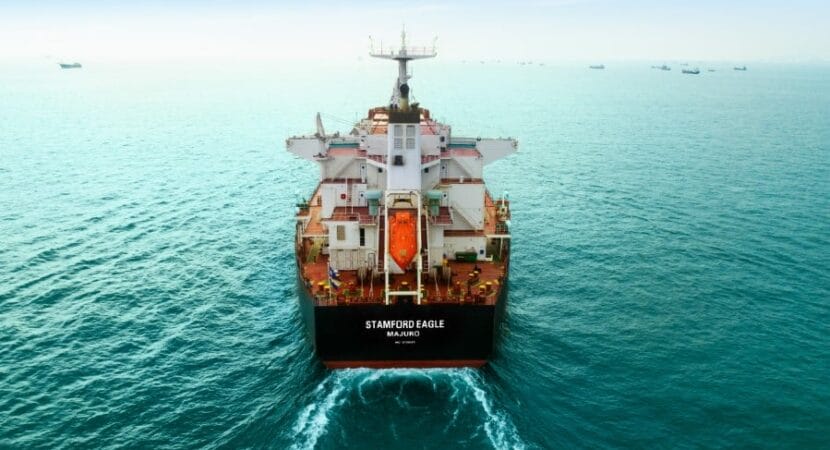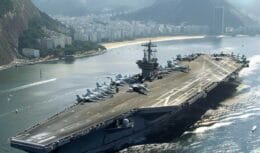
M/V Gibraltar Eagle, bulk carrier hit by Houthi anti-ship ballistic missile in the Red Sea. The escalation of the war in the Middle East increases.
Eagle Bulk Shipping's bulk carrier MV Gibraltar Eagle was the target of renewed attacks in the Red Sea, demonstrating the rise in tensions in the region following recent air offensives led by the US and UK against US positions. Houthis in Yemen.
The dry bulk shipping major confirmed the attack in a statement, revealing that on January 15, the M/V Gibraltar Eagle was hit by an 'unidentified projectile' approximately 160 miles offshore in the Gulf of Aden. The attacks have worried the international maritime community, especially considering the ship is Marshall Islands-flagged and US-owned and operated.
Ship is the target of attacks, but sails normally
‘As a result of the impact, our bulk carrier sustained limited damage in a cargo hold but is stable and is exiting the area.
Seafarers aboard the MV Gibraltar Eagle are unharmed
All our seafarers on board the ship are unharmed. The MV Gibraltar Eagle carries a cargo of steel products.
‘We remain in close contact with all relevant authorities on this matter’, the company said in a statement.
Red Sea attacks impact MV Gibraltar Eagle
O Central Command of USA also reported on the attack, saying Houthi militants fired an anti-ship ballistic projectile from areas of Iemen controlled by the Houthi and hit the M/V Gibraltar Eagle.
‘The ship reported no injuries or significant damage and continues its journey. At the beginning of the day, at approximately 14 pm. (Sanaa time), U.S. Forces detected an anti-ship ballistic missile fired toward southern Red Sea trade routes. The missile failed in flight and impacted land in Yemen. There were no reports of injuries or damage,' US Central Command said.
Air strikes in Yemen increase tensions in the region
As feared by many analysts, the recent airstrikes by the United States and United Kingdom in Yemen did not deter the group, but resulted in greater popularity for the Houthis in Yemen.
Furthermore, the latest round of airstrikes has further increased tensions in an already fragile ceasefire in Yemen.
UN calls for reduction of violence in Yemen
Khaled Khiari, UN Deputy Secretary-General for Middle East, Asia and Pacifico in the Departments of Political Affairs and Peacebuilding and Peace Operations, called for a reduction in violence and containment, saying the region is on a trajectory of escalation dangerous situation that could potentially affect millions of people in Yemen, the region and the world.
‘We are witnessing a cycle of violence that risks serious political, security, economic and humanitarian repercussions in Yemen and the region’, he warned. Recent humanitarian improvements in that country are fragile and could easily be reversed. Furthermore, progress towards reaching a political settlement to end the war in Yemen could be undermined, leaving its people to face the impact of an ongoing conflict.
Conflict in Gaza and impacts on Yemen
Houthi forces have attributed their attacks on ships in the Red Sea to pressure tactics designed to seduce global powers into slowing the Israel's war in Gaza, which claimed the lives of more than 24.000 people, most of them civilians, and bringing desperately needed humanitarian aid. help on the track.
Speaking on the matter yesterday, the Secretary-General of the United Nations, António Guterres, said that Israel's ongoing attack on Gaza has seen levels of civilian killings at an unprecedented rate, fiercely criticizing the collective punishment of the Palestinian people. . He also called for the release of Israeli hostages held by Hamas and legal prosecution for the violence committed on October 7.
The UN also demanded an immediate end to Houthi attacks on commercial shipping in the Red Sea and the release of the aircraft carrier Galaxy Leader and its crew, which were captured in November by Houthi forces.
Impact of attacks on the marine insurance market
Morningstar DBRS, a global credit rating firm, said that following airstrikes by the US and UK militaries against Houthi targets in Yemen on January 11, the marine insurance market now expects rates to rise in following days, as subscribers expect retaliatory strikes from the rebels.
'Prior to the outbreak of the Hamas-Israel war and the Houthi rebels' involvement in the conflict, war insurance rates for ship hulls were a nominal 0,05%, with many underwriters waiving the cost of war coverage entirely for sailing in the Red Sea. However, since the start of hostilities, war rates have increased, reaching 0,7% at their peak. For a ship (excluding the value of cargo) with a total insurable value of US$120 million, this translates into more than US$800.000 in additional insurance costs per trip in the area,' the rating company said.
Maritime war insurance is a specialized type of insurance that covers risks associated with political violence, terrorism and other dangers in maritime transport.
Recent attacks in the Red Sea are expected to increase demand for this type of insurance, as shipping companies and cargo owners look to protect themselves against potential losses, as explained by the rating agency. This development is also expected to have wider implications for marine insurance prices, which are likely to rise in response to increased demand. At the same time, insurers can reassess their exposure in the region and adjust prices accordingly.
Morningstar DBRS said Operation Prosperity Guardian's success in weakening Houthi rebels and deterring regional support is expected to stabilize war insurance prices, albeit at higher levels than before the Hamas-Israel War. On the other hand, a failure in efforts by the US-led coalition could result in the unavailability of war insurance coverage, triggering a shift in maritime traffic to the longer Cape of Good Hope route.
Despite rising tensions, war insurance coverage remains available for Red Sea travel, with prices rising due to escalating violence.
As of January 7, 2024, 354 container ships have been diverted from the Suez Canal to the Cape route, constituting 80% of ships between the Atlantic/Mediterranean basins and the Indian Ocean.
'
Source: © OFF Shore Energy












